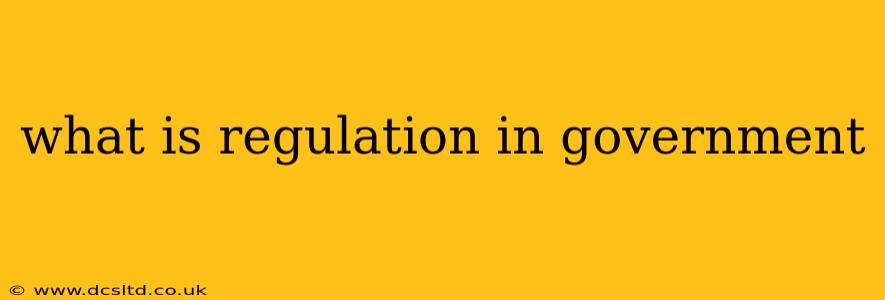Government regulation is the act of controlling business and individual behavior through a set of rules and laws. It's a cornerstone of modern governance, aiming to shape societal outcomes and protect citizens' interests. This involves establishing standards, setting limits, and enforcing compliance across various sectors. But understanding regulation requires delving deeper than a simple definition.
What are the Different Types of Government Regulation?
Regulation isn't a monolithic entity; it manifests in diverse forms, impacting different aspects of life. Here are some key types:
-
Economic Regulation: This primarily focuses on controlling market activities. Examples include antitrust laws preventing monopolies, setting prices for utilities, and regulating banking practices. The goal is often to ensure fair competition, protect consumers, and maintain economic stability.
-
Social Regulation: This addresses societal well-being, often involving health, safety, and environmental concerns. Examples range from workplace safety standards (OSHA) to environmental protection laws (Clean Air Act) and food safety regulations (FDA). The primary focus is safeguarding public health and the environment.
-
Industry-Specific Regulation: Certain industries face unique regulatory frameworks tailored to their specific risks and impacts. For instance, the financial industry is heavily regulated to mitigate systemic risk, while the pharmaceutical industry is subject to stringent regulations ensuring drug safety and efficacy.
-
Self-Regulation: In some cases, industries develop their own internal codes of conduct and best practices, overseen by industry bodies. While offering flexibility, self-regulation often requires government oversight to ensure effectiveness and prevent abuse.
What is the Purpose of Government Regulation?
The overarching purpose of government regulation is multifaceted, aiming to:
-
Protect Consumers: Regulations ensure product safety, fair pricing, and accurate information, shielding consumers from exploitation and harm.
-
Protect the Environment: Environmental regulations aim to mitigate pollution, conserve natural resources, and safeguard ecosystems for future generations.
-
Promote Competition: Antitrust laws and other competitive regulations aim to prevent monopolies and foster a level playing field for businesses.
-
Ensure Public Safety: Regulations cover various aspects of public safety, including workplace safety, food safety, and transportation safety.
-
Protect Workers' Rights: Labor laws and regulations protect workers' rights, including minimum wage, working hours, and workplace safety.
Why is Government Regulation Necessary?
The necessity of government regulation stems from market failures – situations where free markets alone fail to produce optimal outcomes. These failures can include:
-
Information Asymmetry: When one party in a transaction has more information than the other, leading to exploitation (e.g., a manufacturer knowing a product is flawed but not disclosing it).
-
Externalities: Costs or benefits imposed on third parties not involved in the transaction (e.g., pollution from a factory impacting nearby residents).
-
Public Goods: Goods that are non-excludable (everyone can use them) and non-rivalrous (one person's use doesn't diminish another's) like national defense, which are often underprovided by the private sector.
What are the Potential Downsides of Government Regulation?
While regulation offers significant benefits, potential drawbacks include:
-
Increased Costs: Compliance with regulations can increase costs for businesses, potentially leading to higher prices for consumers.
-
Reduced Innovation: Overly stringent regulations may stifle innovation and economic growth by limiting experimentation and risk-taking.
-
Regulatory Capture: Regulatory agencies can sometimes be influenced by the industries they regulate, leading to biased rules that favor the regulated businesses over public interest.
-
Administrative Burden: The complexity of regulations can create a significant administrative burden for businesses, requiring time, resources, and specialized expertise to comply.
How is Government Regulation Enforced?
Enforcement mechanisms vary depending on the specific regulation, but generally involve:
-
Inspections and Audits: Government agencies conduct inspections and audits to ensure businesses are complying with regulations.
-
Fines and Penalties: Businesses that violate regulations can face fines, penalties, or even legal action.
-
Licensing and Permits: Licensing and permitting systems ensure businesses meet specific standards before they can operate.
-
Consumer Protection Agencies: Specialized agencies handle consumer complaints and investigate violations.
Government regulation is a complex and dynamic process. Striking the right balance between protecting public interest and fostering economic growth is a continuous challenge for policymakers. Understanding the different types, purposes, and potential downsides of regulation is crucial for informed participation in the democratic process.
